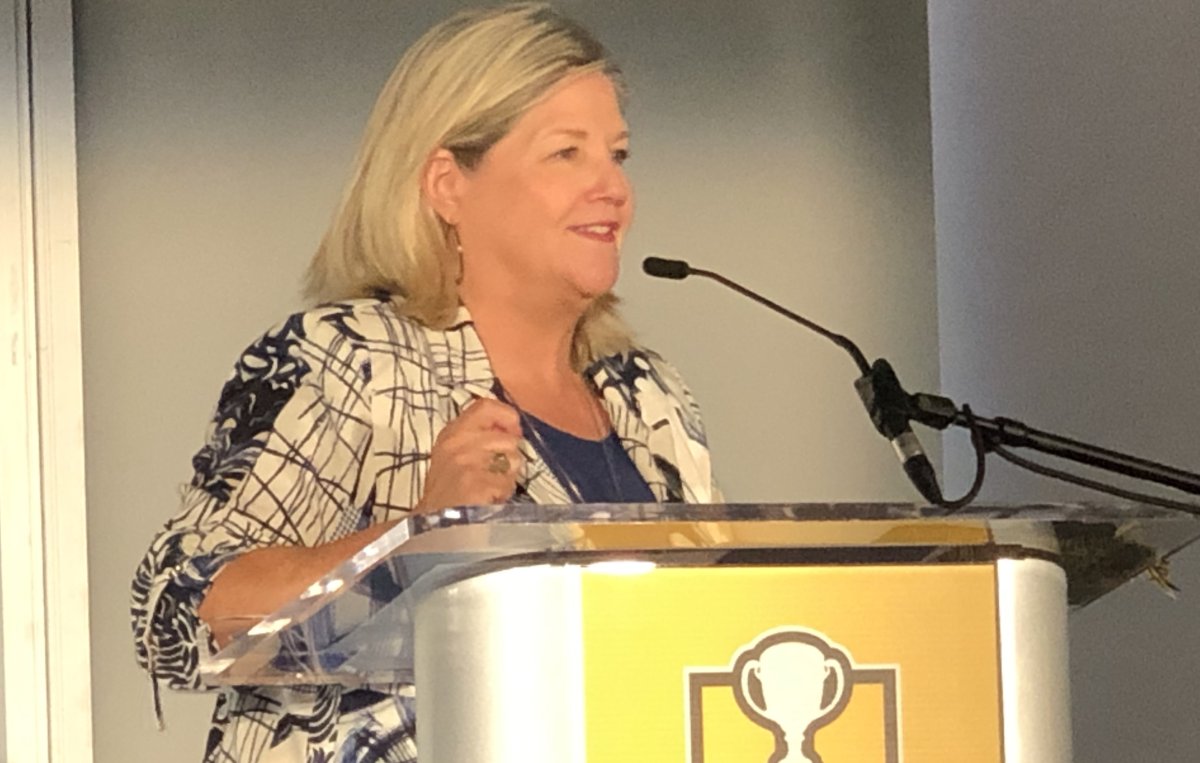Hamilton’s mayor insists the housing crisis is reason enough to flex newly bestowed provincial powers to replace downtown Stoney Creek parking with 67 new affordable housing units.

Andrea Horwath says a “state of emergency on housing and homelessness” that city politicians have recognized time and time again is why she’s stepping up and vetoing a city council deadlock intended to save a pair of surface lots on Lake Avenue South.
“This is not a time for parochialism, it’s a time to step up and do the right thing. That’s exactly why I felt it necessary,” Horwath told Global News.
Strong mayor powers have now been bestowed on 44 municipalities in the past year as per legislation passed by the Ford government’s More Homes Built Faster Act – with the aim of putting up 1.5 million homes by 2031, and advancing related infrastructure like transit, roads and utilities.
Horwath has used the edict a little over a dozen times since some decisions tied to the Ontario act require sign-offs from municipal leaders, like the hiring of municipal department heads, approval of certain by-laws and passing of city budgets.
During the 2022 Hamilton mayoral debate, Horwath submitted she’s always been a “collaborator” when working with fellow politicians “reaching out and bringing people in” for important conversations to find common ground. The then-candidate went on to characterize the idea of strong mayor powers as “not necessary” and even “dangerous.”
Horwath admits she never thought she’d need to resort to them, but submits a 550 per cent increase in the city’s affordable housing waitlist between 2021 and 2022 is a “truth” that “deserves a different perspective.”
“That’s the kind of change that people voted for in this last election, and I really did think we could get there,” said Horwath.
Hours after unleashing her veto, support from several councillors hit social media accounts with Ward 8’s John-Paul Danko, Ward 3’s Nrinder Nann and Ward 1’s Maureen Wilson all backing the move.
The city politician at the centre of the fight to keep the Lake Avenue spots submits the move is “undemocratic” and is a bullying tactic being used against residents in Stoney Creek.
For weeks, Ward 5’s Matt Francis has contested the elimination of the lots would kill businesses situated in the area.
He says city leaders need to focus on more pressing options to build up the city’s affordable housing stock and move items like the variance issue stalling the 131-unit Vranich development at King Street East and Sanford Avenue.
“I sure hope that a minor variance is less important than overriding an entire community,” Francis said. “There’s a perfect example of maybe that’s where you should be using your strong mayor power and not overriding an entire community.”
Francis alleges he did bring a motion forward for alternatives that could replace units lost from the Lake Avenue project, including plans near the Dominic Agostino Riverdale Community Centre.
“Council didn’t want to work with me, and neither did the mayor,” he suggests. “My residents are going to suffer as a result of this, … and the thing that scares me about this isn’t just exclusive to Stoney Creek, it could be any community now.”
- Grocery code: How Ottawa has tried to get Loblaw, Walmart on board
- Alberta to overhaul municipal rules to include sweeping new powers, municipal political parties
- Military judges don’t have divided loyalties, Canada’s top court rules
- Canada, U.S., U.K. lay additional sanctions on Iran over attack on Israel
Horwath says the difference between the Lake Avenue properties and the potential Agostino development is timing.
She says construction of the two lots could be expedited through quick approvals, whereas the Dominic Agostino idea might “take years and years and years, if ever” since provincial approval would be needed to bypass restrictions limiting housing on school properties.
“Does that mean we will we want them to stop that exploration? Absolutely not,” Horwath explained. “But in the meantime, we have to keep identifying properties all across our city, that we can as quickly as possible build housing on.”
Use of the strong mayor powers Wednesday means Hamilton’s council now has 21 days to vote to accept or refuse Horwath’s veto, with a refusal requiring two-thirds of council votes.
The mayor only needs to get a third of the city’s 16 councillors on board to pass legislation.


Comments